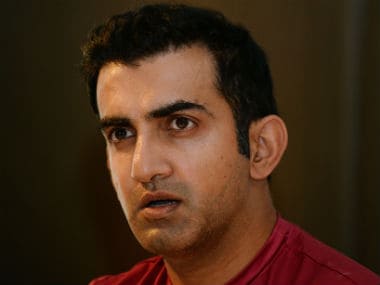Former cricket Gautam Gambhir joined the Bharatiya Janata Party (BJP) on Friday saying that he was “influenced” by Prime Minister Narendra Modi’s “vision for the country”. “I have been influenced by the prime minister, his vision for the country. This is a fabulous platform for me to do something for the country,” the 37-year-old said.
Gambhir joins an increasingly long list of sportspersons who have trained their aim on the game of politics in India. Politics and sports have often merged in India over the decades, both being closely followed by the citizens.
Politics is usually on the front page of a newspaper, the other mostly at the back. But in election season, politics and sports converge, defying the old adage that the two do not and should not mix.

Sportspersons have long dotted the political arena
This election, seasoned names like Rajyavardhan Singh Rathore, Kirti Azad and Navjot Singh Sidhu, and now Gambhir are in the reckoning. “I feel sportspersons have a drive to do something for the nation, and whether they are on the playing field or in the field of politics, they always have that in them,” Olympics silver medallist and Union minister Rathore told PTI.
The 16th Lok Sabha featured accomplished sportspersons like Rathore, a BJP leader who is Minister of State for Information and Broadcasting, as well as former cricketer Kirti Azad (in the BJP to start with and now with the Congress), former football captain Prasun Banerjee (Trinamool Congress) and national-level shooter Kalikesh Narayan Singh Deo (BJD).Deo won a trap gold at the national junior shooting championships in 1991.
Rathore, a double trap shooter, became a path-breaker when he was appointed the first sportsperson to helm the sports ministry in September 2017. He now holds independent charge of the I&B ministry.
“I think it is encouraging that sportspersons are deciding to play an active role in politics and therefore, in nation building. Their career in sports makes athletes disciplined and focussed,” Rathore said when asked about his thoughts on sportspersons taking the political plunge.
“They also have a target-oriented approach and are go-getters. These are qualities that are essential in a good leader,” said the first-time MP from Jaipur (Rural). Gambhir, Rathore, Azad, and Banerjee are, however, not the first and neither will they be the last to join politics.
The 15th Lok Sabha had, apart from Azad and Deo, former cricket captain Mohammed Azharuddin (Congress) and his ex-teammate Navjot Singh Sidhu (BJP). Azharuddin was in the fray from the Moradabad constituency in 2014 as well but ended up on the losing side.
Sidhu, on the other hand, made his way to the Rajya Sabha after being denied a ticket in 2014 and eventually quit the BJP to join the Congress. In 2004, celebrated middle distance runner Jyotirmoyee Sikdar, who won two gold medals in her only Asian Games appearance, represented West Bengal’s Krishnanagar constituency for the CPM.
Among the earliest to make the seamless transition from sports to politics was hockey star Aslam Sher Khan — a World Cup gold-medallist and an Olympic bronze-medallist. Khan was first elected to Lok Sabha in 1984. He won again in 1991 before losing four elections after that.
Chetan Chauhan, the man who partnered Sunil Gavaskar in many a memorable stand, was a two-time MP, winning the Amroha constituency for the BJP in 1991 and 1998. No active sportsperson has entered politics for now, PTI reported.
There are tangential connections too. Cricketer Ravindra Jadeja’s wife Riva Solanki has joined the BJP. She also headed the women’s wing of the controversial Karni Sena — the self-proclaimed representative of the Rajput community which grabbed headlines for violent protests against period Bollywood films deemed offensive by it.
So what pulls athletes to politics?
According to Rathore, it’s primarily the drive to do something for the nation. “When I joined politics I was often asked how it is to be a politician after being an army man and a sportsperson. I feel the commonality is that in all my roles, I have the privilege of serving the country,” said Rathore.
Not all have been successful though. Former cricketer Mohammed Kaif, who contested once in 2009 for Congress, lost from Uttar Pradesh’s Phulpur, the constituency best known for being represented by first prime minister Jawaharlal Nehru.
Iconic footballer Bhaichung Bhutia contested for the TMC in 2014, in what was termed a wave election for the party, but lost. He is, however, unfazed and has floated his own party in native state Sikkim for the upcoming polls.
Former national swimming champion-turned-actor Nafisa Ali tried her luck twice, with Congress in 2004 and SP in 2009, but didn’t win even once. Competitive role aside, sportspersons will play an active role in encouraging a higher voter turnout this election.
Prime Minister Narendra Modi has called on cricket icons Sachin Tendulkar, a former Rajya Sabha member, Virat Kohli, Mahendra Singh Dhoni, Rohit Sharma, Virender Sehwag, and champion wrestlers Bajrang Punia and Vinesh Phogat to spread the word on the importance of voting.
Rising cricket star Rishabh Pant and Commonwealth Games gold-winning table tennis sensation Manika Batra have been roped in for a similar campaign by the poll panel. Sportspersons are also common sight in the Rajya Sabha where honorary memberships is quite regular.
The most high-profile among the sitting Rajya Sabha MPs is boxing stalwart MC Mary Kom, who claimed her sixth world title while being an active member last year. Before her, Tendulkar had added a bit of political history to his cricketing accomplishments by becoming the first active sportsperson to be nominated to the House of Elders.
source: Firstpost.com






































